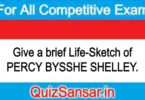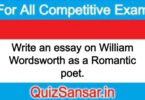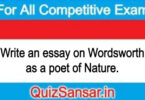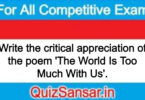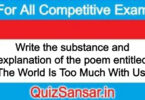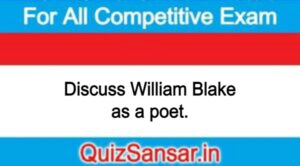
Discuss William Blake as a poet.
Discuss William Blake as a poet.
Or
Give a general estimate of Blake as a poet.
Or
Blake is a representative of the new age. Do you agree? Comment.
Ans.
A Representative Poet
Blake is a representative of the new age. Genuine interest in his poetry and in his designs dates from the middle of the nineteenth century, that is 1868 when Swinburne’s essay on Blake appeared. His ideas were then found to be in harmony with new ethical and spiritual tendencies. His view of Christ’s message as one of joy was a protest against the doctrine of renunciation and sorrow. His insistence upon what came to be called ‘fulness of life’ was agreeable to the generation influenced by Swinburne and Pater.
A Poet of Inspiration
Of all the traditional poets of the eighteenth century, Blake is the most original and the most spontaneous. He is the poet of inspiration. He follows no man’s lead, and obeys no voice except that which he hears in his own mystic soul. As a child he had visions of God and the angels look in at his window and as a man he thought that the souls of the great dead came to visit him-Virgil, Homer, Dante, Milton- ‘majestic shadows, gray but luminous.’ To him all nature was a great spiritual symbolism, in which he saw fairies, elves, angels, devils all looking at him through the eyes of flowers and stars. He seems never to have asked himself the question how far these visions were pure illusions.
As a Visionary
As a visionary he touched both Art and Letters; he is ever looking behind the visible frame of things, for the glories and terrors of the world of spirit; not with the earnest, ethical-intent of Wordsworth, but with the eye of one who cannot help dreaming dreams and seeing visions. The visionary in him may and often will overpower the artist, and a wild confusion of imagery often blurs his work, whether as draughtsman or singer; but if at times it dawns his clarity and simplicity, it gives a phantom touch of extraordinary subtlety, and too much of his work had an exquisite beauty, that lifts his lyric faculty into an atmosphere like that of no other poet. Blake himself declared: “The Nature of my work is Visionary or Imaginative.”
The Most Original Poet of his Age
Of all the romantic poets of eighteenth century, Blake is the most independent and the most original. In his earliest work, written when he was scarcely more than a child, he seems to go back to the Elizabethan song writers for his models, but for the greater part of his life he was the poet of inspiration alone. As a lyric poet he may be rated with Donne, Burns and Wordsworth. Simplicity, naturalness, sweet music, mystical and spiritual colouring, spontaneity, revolt against convention, a yearning for freedom, purity and innocence are the chief characteristics of his lyrics. Their remarkable brevity and directness, their child like straightforwardness and suppleness are also remarkable.
As a Mystic
Both the naturalism and mysticism of the Romantic Revival found expression in Blake; and on this point he differs from pioneers like Burns, who is simply naturalistic, or Cowper, who only slightly touched by mysticism. On the naturalistic side he deals with the simplest phase of life; with the instinctive life of the child; with the love of flowers, hills and streams, the blue sky, the brooding clouds, and yet the mystical vision of the poet is always transforming these familiar things touching obscure aspects, and spiritualising the variest commonplace into something strange and wonderful. To Blake every spot is holy ground; angels shelter the birds from harm, the good shepherd looks after his sheep. the divine spark burns even in the breasts of savage animals. Cruelty to animals incensed Blake, he would give them the same freedom he wishes for human kind. Mysticism in his poetry is blended usually with a wistful melancholy. He feels more and more dissatisfied with the show of life. He is by and large a joyful music. For him the morning stars sing together, and the splendour of life outweighs its shadows. There are no mournful regrets in his verse, no sighing for a day that is dead. Evil rouses his anger, not his tears. Sorrow he accepts cheerfully as a necessary twin to joy. He, therefore, believes in the doctrine of contraries, for a perfect life consists of joy as well as sorrows, of the bright as well as the dark side.
A Great Romantic
So Blake as a poet is known as a romantic poet, as a lyric poet, as a visionary and a mystic. Above all he is a pure artist, and this aspect must not be ignored because of our involvement in his other aspects. “He is”, says Saintsbury, “a singer of the beauty and mystery, the glory and terror of God.” His style has the quality of ‘rightness’ which is the mark of all truly great poetry. He is an upholder of the principle of liberty, equality and fraternity, the liberator of poetry from the classical, matter-of-fact and restrained, suffocated prosaic world, a lover of Nature and childhood.
Lyricism
His songs are spontaneous bird-songs. Gilchrist said of him, “He was a man without a mask, his aim single, his path straightforward, and his wants few; so he was free, noble and happy.”
Conclusion
The merits of Blake are that Blake sings of the human soul. He has intense vision, prophetic imagination, experiential mysticism. He also possesses luminous simplicity of meaning and magic childlikeness of thought, intense ecstatic sensitiveness to impressions. But he has some defects too. His mysticism is too elaborate; his symbols are obscure. Sometimes one and the same symbol is used for various interpretations. Often he is dogmatic, he is also unable to express his sensibilities. He is unable to weave a narrative or plot to sustain his imaginative perceptions. His mind is undisciplined; it lacks balance, scope and tolerance which a classical training might have provided. His mind moves in a mystic manner; it requires metaphor. He sees not likeness but identities.
- What is meant by Database Management System?
- Discuss the advantages and drawbacks of database.
- What do you mean by database ? Discuss its Characteristics.
- What is Data Mining?
- What are the conditions of communication?
- What do you mean by business communication ?
- organization / Differentiate between classical and modern theory of organization
- What is forecasting

